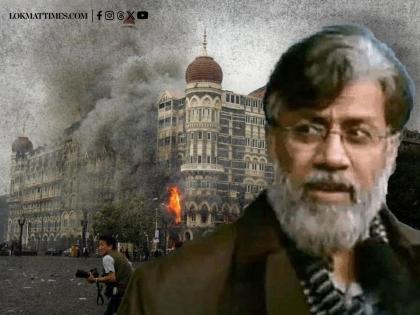26/11 Terror Attacks: Who Is Tahawwur Rana? Why Is He Being Extradited To Mumbai?
By Lokmat English Desk | Updated: April 10, 2025 10:54 IST2025-04-10T10:54:13+5:302025-04-10T10:54:18+5:30
A Pakistani-Canadian businessman and former military physician named Tahawwur Hussain Rana is being extradited to India to face allegations ...

26/11 Terror Attacks: Who Is Tahawwur Rana? Why Is He Being Extradited To Mumbai?
A Pakistani-Canadian businessman and former military physician named Tahawwur Hussain Rana is being extradited to India to face allegations in connection with the 2008 Mumbai terror attacks. After he tried every legal option to prevent his extradition, a special flight transporting him left the United States this evening. According to the sources, he will arrive in Delhi this afternoon, April 10, and the National Investigation Agency will immediately take him into custody. Rana, 64, is being deported to India to face legal repercussions for his involvement in the 2008 Mumbai terrorist bombings, which claimed 157 lives. The US Court rejected his appeal to prevent his extradition to India. According to Monday's update, the Supreme Court docket stated, "Application (..) denied by the Court.”
Rana was born in Chichawatni, Pakistan, on January 12, 1961. Prior to entering the corporate world, he was a captain in the Pakistan Army Medical Corps. In addition to running an immigration services company, he had connections to Lashkar-e-Taiba (LeT), the Islamist militant organisation located in Pakistan that planned the 26/11 attacks. Rana's connection to David Coleman Headley, a Pakistani-American terrorist and a major conspirator in the Mumbai attacks, is another well-known aspect of his reputation.
Investigative organisations claim that Rana was instrumental in enabling Headley's reconnaissance efforts in India. Under the pretence of an immigration consultancy, he established a front office in Mumbai and assisted Headley in obtaining a visa to India. Headley used this office as a front for his surveillance operations, targeting areas that LeT agents eventually attacked. Rana actively assisted Headley in organising attacks on prominent targets, such as the National Defence College and Chabad Houses, knowing of his ties to terrorism.
Ten LeT agents carried out a series of well-planned terrorist operations in Mumbai between November 26 and November 29, 2008, which were known as the 26/11 Mumbai attacks. The assailants targeted well-known sites such as Nariman House, the Oberoi Trident Hotel, the Taj Mahal Palace Hotel, and the Chhatrapati Shivaji Maharaj Terminus (CSMT). Armed with AK-47 rifles, grenades, and explosives, they carried out explosions and mass shootings that left over 300 people injured and 175 people dead, including nine attackers. The siege, which lasted for about 60 hours, was widely denounced.
Also Read: Mumbai Attack Accused Tahawwur Rana, Extradited from US, To Face NIA in Delhi Today: Sources
In October 2009, Rana was taken into custody by the FBI in Chicago on suspicion of giving material support to terrorism. Despite being found guilty in 2011 of helping LeT carry out its planned attack on the Danish newspaper Jyllands-Posten, a US judge cleared him of all charges directly connected to the Mumbai attacks because of jurisdictional restrictions. But in 2020, India requested his extradition, claiming he was involved in the assault preparation.
Following years of legal disputes, including appeals based on medical conditions like Parkinson's disease and stomach problems, US courts rejected Rana's attempts to prevent extradition. Earlier last week, the Supreme Court denied his last petition.
Open in app